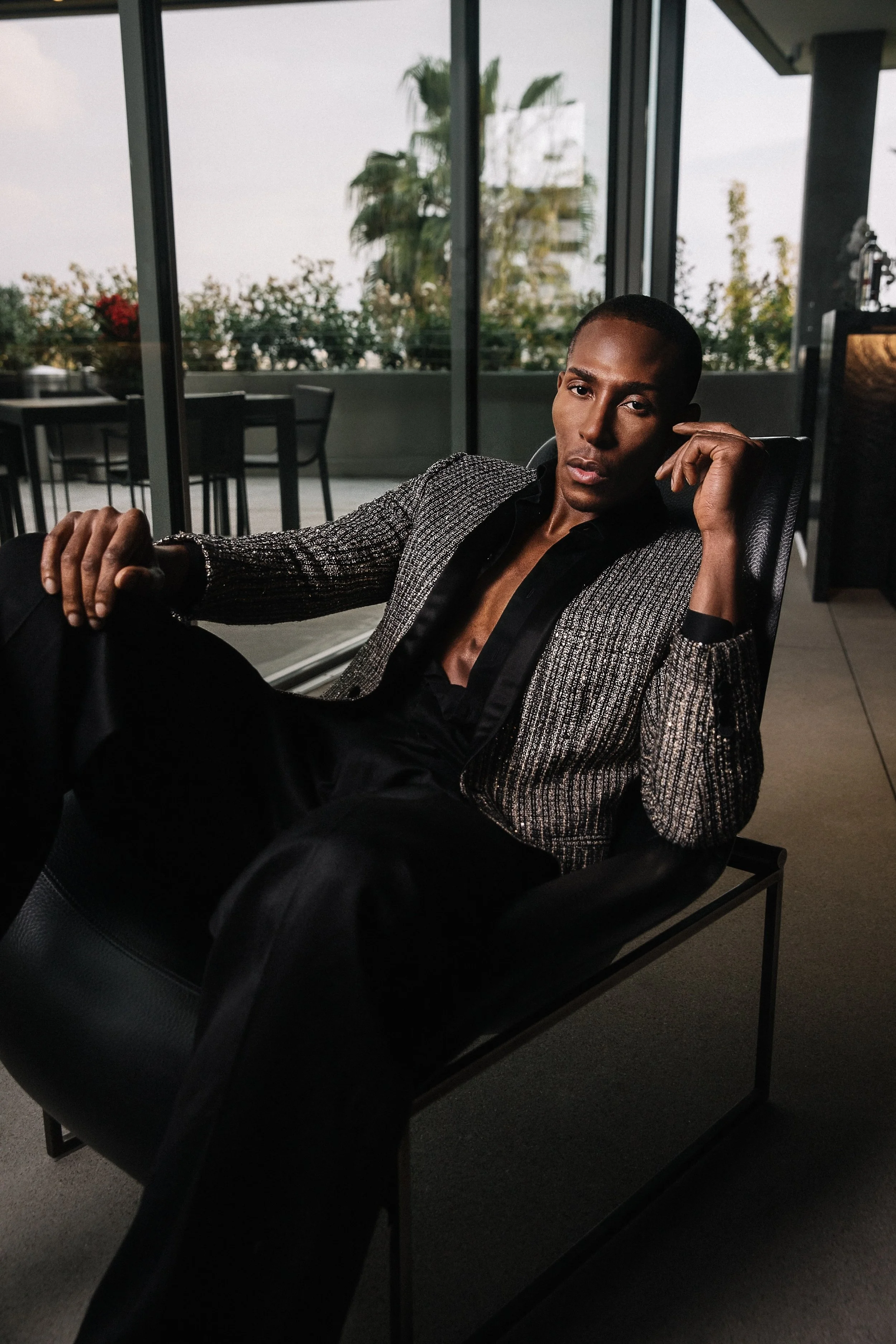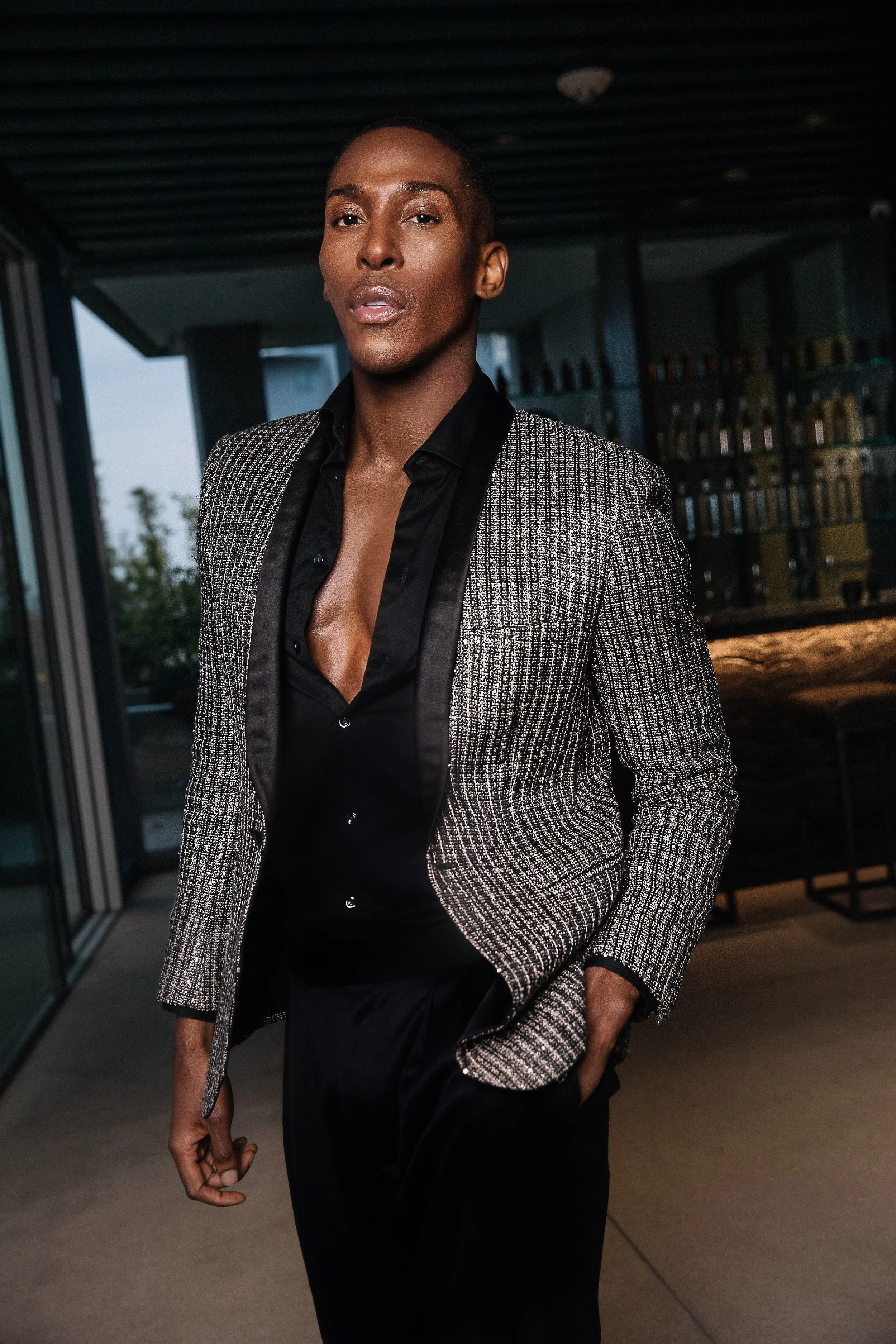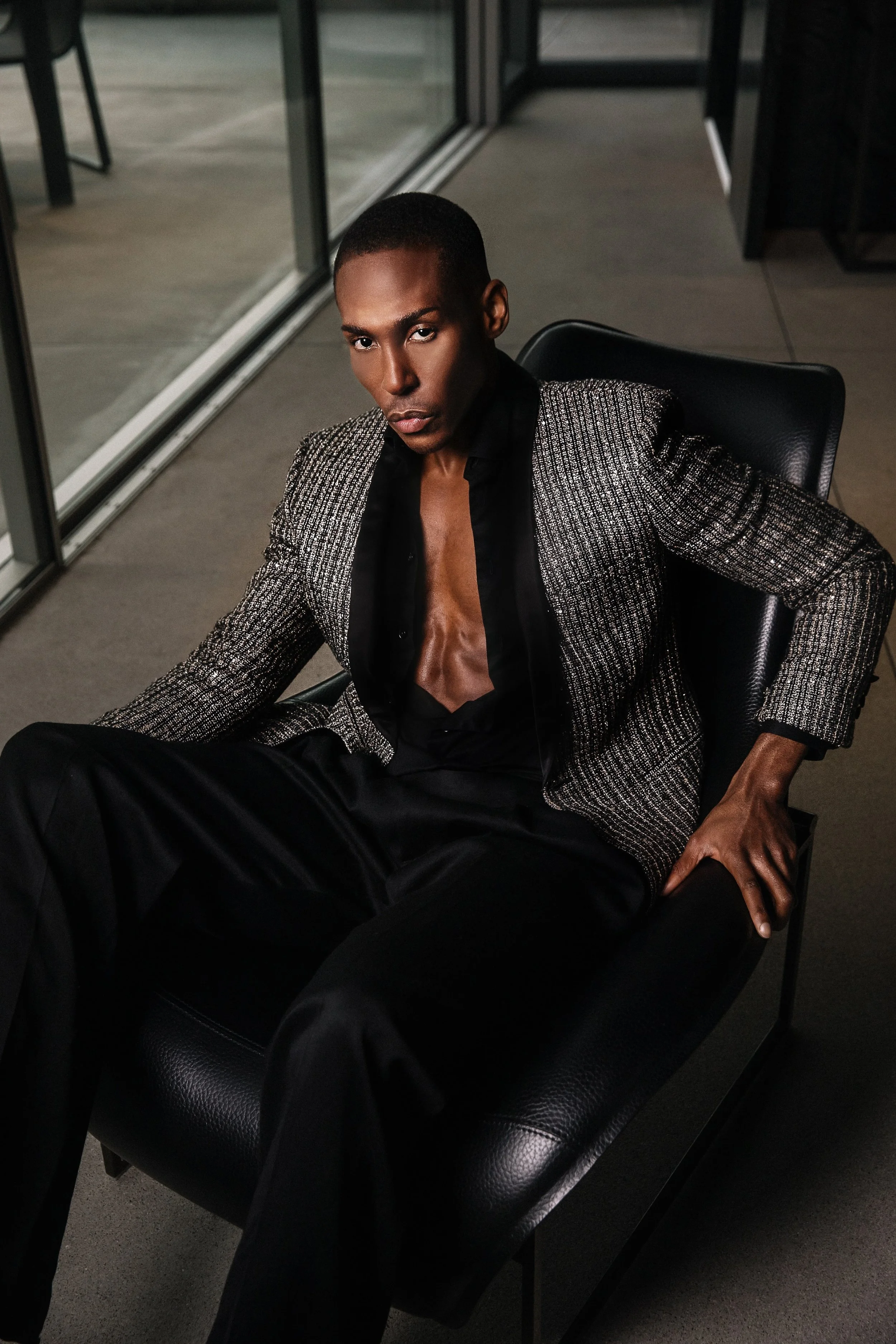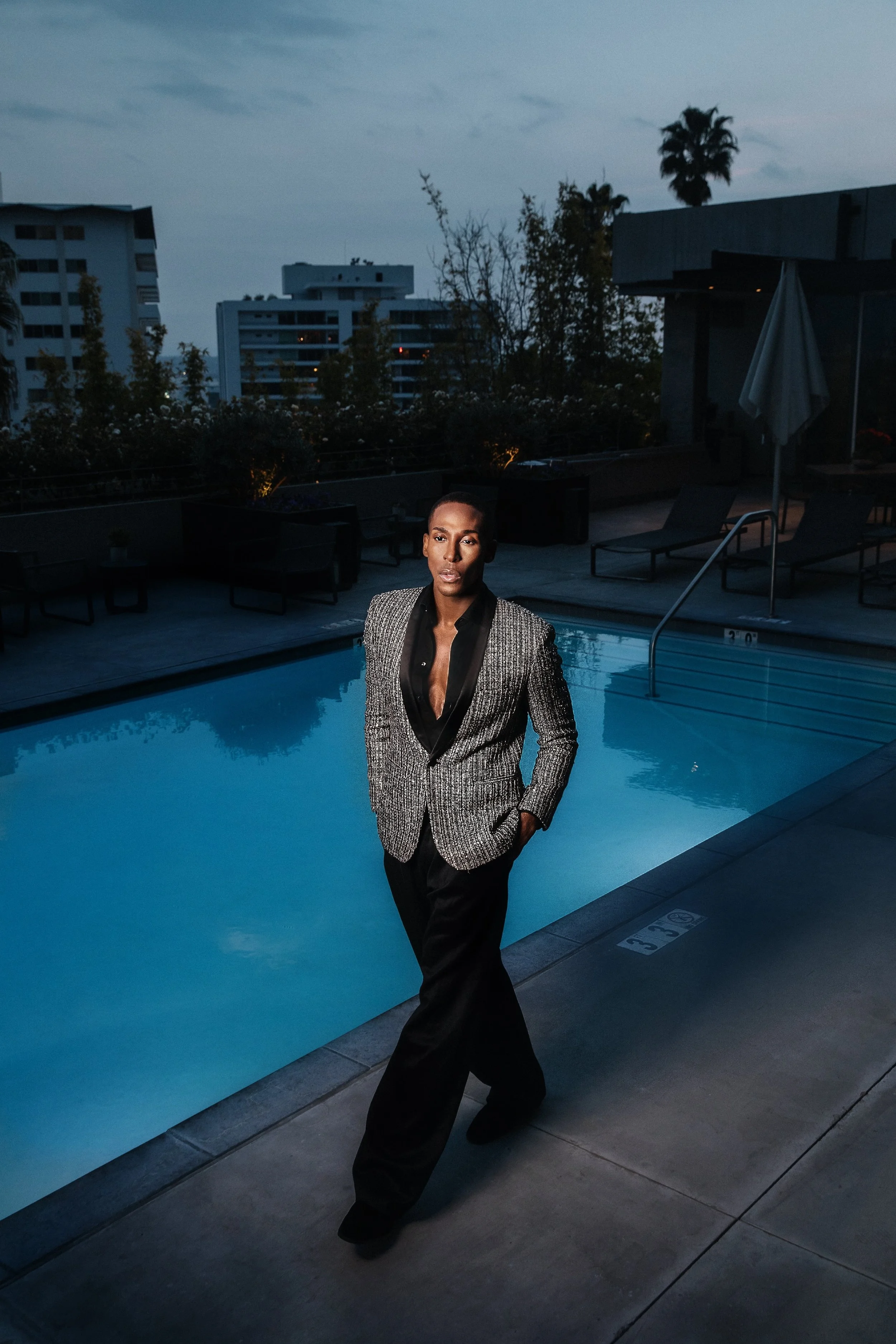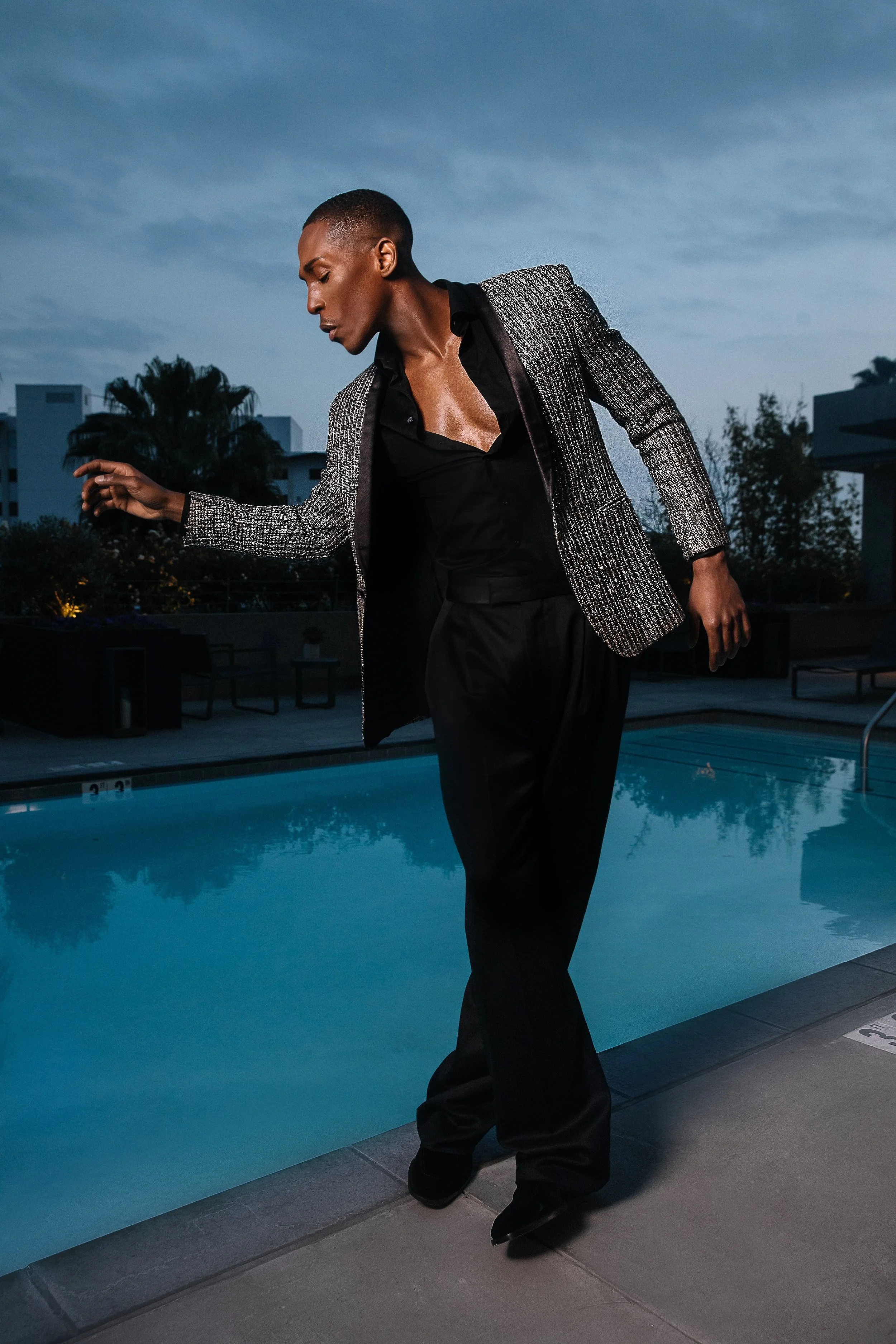IN CONVERSATION WITH JOSHUA UDUMA
interview JANA LETONJA
Joshua Uduma is a Nigerian-American actor, producer, and entrepreneur whose work blends artistry, purpose, and impact. He has brought his range and charisma to projects like Lionsgate’s ‘The Swing of Things’, Apple TV+’s ‘Little America’, and the upcoming feature ‘The Trainer’. In ‘The Swing of Things’, Joshua not only delivered a standout comedic turn as Tyrone but also made his debut as an executive producer. Beyond the screen, his philanthropic efforts include developing one of the first American-standard hospitals in Nigeria, driven by a mission to improve healthcare in underserved communities. He is also a wellness advocate, building a loyal audience with his dynamic fitness and lifestyle content.
You’ve worked across comedy, drama, and producing. How do you choose which projects to take on?
To be frank, I believe it all depends on the story and how I can relate to it, and how I see others able to relate to it. We tell these stories to bring the unity of people in many ways. Some time ago, I devoted time to studying how people live life in their day to day and spent time listening to them. You can find out a lot about what people need in their life just by deeply listening, whether it’s joy, love, peace, a great laugh, and more.
‘The Swing of Things’ marked your first executive producer credit. What was the biggest learning curve in stepping behind the camera?
There were so many learning curves from filming this project, especially in a foreign land. Firstly, stay structured. Have a keen sense towards vision path and mission you’ve set in motion. Let this be your guide. The script does one thing, in the sense of helping you with telling the story, but there are so many other moving parts. You have to be able to comprehend the multiple ways to steer or guide the ship with the director and other producers to ensure all things comes together. That could be making sure the right actors are attached and involved, keeping track of the financial budget obligations, or taking part in the negotiations for the right locations and that partnerships are aligned with the vision. It’s a blessing to understand all of these elements for a first time producing project.
Comedy and drama require different muscles. Do you approach your preparation differently for each?
I believe both are approached in a similar way, but different methods to breaking down my level of vulnerability per story and as the story progresses. In drama, I know there’s an aspect of staying vulnerable to an extent of peeling back the layers of the character, scene by scene. As the story masterfully unfolds, I take the audience on a journey deeper into my very core and depth of my character to show a stronger layer of oneness between my character and the audience. In comedy, it’s all vulnerability at the highest level, from start to finish. This form of vulnerability is all about telling the truth with no guards, no shyness, nothing hindering the most true and authentic reactions from being expressed. If a character is a mess, then show it. Don’t hold back. If they are a seductive individual who aims to act like a real life corporate professional, then I’d play on the clash of those two worlds as unapologetic as can be.
How has your Nigerian-American heritage shaped the stories you want to tell?
If you know of any Nigerians, you know they may be classified as the most comedic culture on planet earth, and that’s without trying. You’ll never find a Nigerian that won’t make you weep from laughter just talking about comments their parents or relatives said to them. Being that I’m 1st generation Nigerian-American, raised from the south, in an area more on the “hood” side,, you can imagine the melting pot of “what the f***k” moments that was forced on my upbringing. Yes, forced on me. Champagne problems I guess. These moments, if I were to express them to you, your eyes would be red from the stressful, intense laughter of the unreal storylines I’ve had to endure. But, I’ll spare you the joyful pain.
With ‘The Trainer’ on the horizon, what can you share about the film and your role in it?
The film is hysterical. I mean, actually funnier than you can possibly expect. From watching Vito Schnabel execute an unexpected role that’ll having you in tears, or Julia Fox delivering the most nonchalant, unmatched satirical performance I’ve seen in a while, to Tony Kaye doing what he does exceptionally well and always creating a real life masterpiece with his incomparable visionary mind, the film is a comedic remedy for the society we are in now. My role in the film is to simply aid in Vito’s character confidence in the most unexpected way. For the rest, you just got to wait and see.
You’re also developing ‘Amazon Lost’ and ‘Civil’. What themes or messages are at the heart of these projects?
Journey and exploration through life and the things we all go through. For every story line, there is a group of people around the world who can and will relate to it. These stories, and the multiple others to come, do just that, but take it a little bit further.
As someone who produces and acts, how do you balance creative vision with the realities of production?
This is a beautiful question. Let’s take an idea of a “cool” painting that’s randomly popped up in your head. You see the blues, the reds, the oranges, and the purple to yellows blends coming to life on that painting. You don’t know what it is yet, but you know there’s something you fancy about the concept of these colors folding together, all on one large picture frame. Now, you boldly decide to go buy the colors and the right size canvas, the correct colors and decide whether it’s acrylic or oil paint you’ll be using, intricately choose the right size brushes to begin the correct strokes for this journey, set up in a studio or your living room, whichever brings the most comfort, and you now start. There’s no guarantee that the way you start will be how the painting I saw in my head ends. What I do know, along the journey, piece by piece and stroke by stroke, the picture is coming together. I’ll get to the end. I always do. But what will happen is that it will always end up being better than that initial random, imaginary idea I first had in my head.
Your philanthropic hospital project in Nigeria is a remarkable undertaking. What inspired you to pursue it?
My mother. My real-life superhero and motivator. She is the one who had the God-given visionary dream of doing something of this magnitude that would be a paradigm shift for the region itself. Because of that, it formed a magnetic union between me and my siblings to come together to help join this journey and do our part to make sure things came to life. This project is a one of kind that has never been done before, where it incorporates several wards with state of the art equipment and machines from the United States that serve as the beacon of hope for changing and saving several lives.
What have been the biggest challenges in bringing a large-scale healthcare initiative to life?
There’s quite a bit too many to count and name, if you can imagine. From the adequate selections of top hospital grade machines, to ensuring each of the equipments are shipped with the upmost care as some of them may be destroyed from something as simple as tilting it on the wrong side. This was a joyful stressor we just had to get used to. But in reality, nothing of this magnitude will or would ever come easy. That would be a shame if it did, because of the new tier of character development that comes with a experience such as this. Though I set my mind and keep it set on attaining these grandeur tasks and accomplishments through life, I need the character itself to keep me at the position of holding that platform. I’d never want to take that for granted. I’ve seen what happens when people are catapulted to the top and not having the character discipline to keep them there.
How do you see your philanthropic work intersecting with your work in entertainment?
They all come together to do one purpose, to tell a story that will change lives. What is more important than that one mission? Doing effective work that becomes a shift for people is an unmatched blessing many people can’t and sometimes won’t ever get the privilege of being able to do. To me, I feel like I’ve completed life’s work in the end.
How do you recharge creatively between projects?
Sleep. In addition to that, working out so hard that it also forces me to sleep. I train a lot with the ALO team so they keep me in my best shape and help me with the best mental clarity I need to keep pushing through. Not sure what I’d do if I were not able to balance the two worlds. Not to mention my team that keeps me in check and well grounded to be able to do what I have to do with a balanced, yet very efficient schedule.
What message do you hope people take away from your body of work—both on screen and off?
The most important thing I want people to take away from my work is that anything is possible. Though it requires many steps, and a great load of stamina, you really can do anything as soon as your mind is set and locks in on it. Think about it, what can’t a human being do? Have we not seen throughout history that anything is possible through setting our mind and keeping it set? That’s me. Every thing I’ve been able to do, I pray people find the unwavering belief that nothing can keep them from doing that and more. I want everyone to know, we can and will do it together.
CREDITS
photography DYLAN PERLOT

